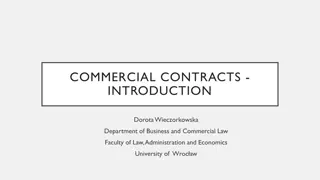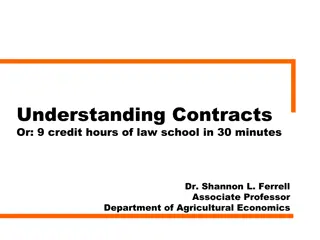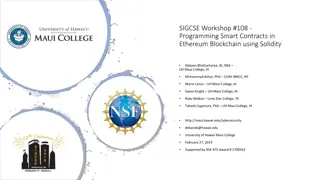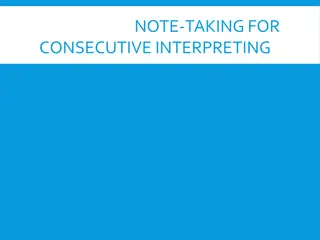Principles of Interpreting Wills and Contracts According to UKSC Cases
When interpreting contracts or wills, the court aims to discern the intention of the parties by considering the natural meaning of words, document's purpose, known facts, and common sense, while ignoring subjective intentions. The principles outlined in UKSC cases like Marley v Rawlings emphasize interpreting within contextual circumstances, whether for commercial contracts or wills. The Administration of Justice Act 1982 allows extrinsic evidence in specific instances of ambiguity in wills.
Download Presentation

Please find below an Image/Link to download the presentation.
The content on the website is provided AS IS for your information and personal use only. It may not be sold, licensed, or shared on other websites without obtaining consent from the author.If you encounter any issues during the download, it is possible that the publisher has removed the file from their server.
You are allowed to download the files provided on this website for personal or commercial use, subject to the condition that they are used lawfully. All files are the property of their respective owners.
The content on the website is provided AS IS for your information and personal use only. It may not be sold, licensed, or shared on other websites without obtaining consent from the author.
E N D
Presentation Transcript
INTERPRETATION OF WILLS DIFFICULT POINTS OF CONSTRUCTION BY HELEN GALLEY
MARLEY V RAWLINGS MARLEY V RAWLINGS [2014] UKSC 2 19. When interpreting a contract, the court is concerned to find the intention of the party or parties, and it does this by identifying the meaning of the relevant words, (a) in the light of (i) the natural and ordinary meaning of those words, (ii) the overall purpose of the document, (iii) any other provisions of the document, (iv) the facts known or assumed by the parties at the time that the document was executed, and (v) common sense, but (b) ignoring subjective evidence of any party s intentions. In this connection, see Prenn at 1384-1386 and Reardon Smith Line Ltd v Yngvar Hansen-Tangen [1976] 1 WLR 989, per Lord Wilberforce, Bank of Credit and Commerce International SA v Ali [2002] 1 AC 251, para 8, per Lord Bingham, and the survey of more recent authorities in Rainy Sky, per Lord Clarke at paras 21-30.
20. When it comes to interpreting wills, it seems to me that the approach should be the same. Whether the document in question is a commercial contract or a will, the aim is to identify the intention of the party or parties to the document by interpreting the words used in their documentary, factual and commercial context. As Lord Hoffmann said in Kirin-Amgen Inc v Hoechst Marion Roussel Ltd [2005] 1 All ER 667, para 64, No one has ever made an acontextual statement. There is always some context to any utterance, however meagre. To the same effect, Sir Thomas Bingham MR said in Arbuthnott v Fagan [1995] CLC 1396, that [c]ourts will never construe words in a vacuum . Page 8 21. Of course, a contract is agreed between a number of parties, whereas a will is made by a single party. However, that distinction is an unconvincing reason for adopting a different approach in principle to interpretation of wills: it is merely one of the contextual circumstances which has to be borne in mind when interpreting the document concerned. Thus, the court takes the same approach to interpretation of unilateral notices as it takes to interpretation of contracts see Mannai Investment Co Ltd v Eagle Star Life Assurance Co Ltd [1997] AC 749, per Lord Steyn at 770C-771D, and Lord Hoffmann at 779H780F.
SECTION 21 ADMINISTRATION OF JUSTICE ACT SECTION 21 ADMINISTRATION OF JUSTICE ACT 1982 1982 Section 21 of the Administration of Justice Act 1982 which modify the Marley principles so as to allow evidence of the testator s subjective intentions in limited circumstances as below: (1) This section applies to a will (a) in so far as any part of it is meaningless; (b) in so far as the language used in any part of it is ambiguous on the face of it; (c) in so far as evidence, other than evidence of the testator s intention, shows that the language used in any part of it is ambiguous in the light of surrounding circumstances. (2) In so far as this section applies to a will extrinsic evidence, including evidence of the testator s intention, may be admitted to assist in its interpretation.
Margaret Burns as executor of Margaret Burns as executor of Daisy Bean deceased v Karen Bean and others v Karen Bean and others [2021] EWHC 838 (Ch) Daisy Bean deceased My Trustees shall then distribute the balance remaining [ which I shall call my residuary estate ] equally among all of my children who are alive at my death . T had 4 children, one of whom, George, had predeceased her, leaving 5 children some of whom were minors. Question was was the residue divided between the 4 who survived T or those 4 plus the children of George
SECTION 33 WILLS ACT 1837 (1) (a) (b) (c) then, unless a contrary intention appears by the will, the devise or bequest shall take effect a devise or bequest to the issue living at the testator s death. (2) Where (a) a will contains a devise or bequest to a class of persons consisting of children or remoter descendants of the testator; and (b) a member of the class dies before the testator, leaving issue; and (c) issue of that member are living at the testator s death, then, unless a contrary intention appears by the will, the devise or bequest shall take effect as if the class included the issue of its deceased member living at the testator s death. (3) Issue shall take under this section through all degrees, according to their stock, in equal shares if more than one, any gift or share which their parent would have taken and so that (subject to section 33A)no issue shall take whose parent is living at the testator s death and so capable of taking. Where a will contains a devise or bequest to a child or remoter descendant of the testator; and the intended beneficiary dies before the testator, leaving issue; and issue of the intended beneficiary are living at the testator s death, as
Did the Will evidence a contrary intention Ling v Ling [2002] WTLR 553 If my said Wife shall die in my lifetime or shall fail to survive me by the period aforesaid, the Bank shall stand possessed of my residuary estate UPON TRUST for all or any of my children living at my death or at the expiry of one calendar month therefrom who attain or shall have then attained the age of twenty one years and if more than one then as tenants in common in equal shares absolutely. Etherton J held at [27] that the words living at my death achieved nothing and were only there to state expressly what would otherwise be implicit, namely that a class is normally composed of those members, if any, existing at the date of death of the Testator. They gave, he held, no indication of any intention that a child s issue should be excluded from taking the child s share under s.33(2)
Rainbird v Smith [2012] EWHC 4276 (Ch) where the relevant clause provided: I give my estate (including any property over which I may have a general power of appointment or disposition by Will) to my Trustees Upon Trust .. (c) subject thereto hold the residue remaining and the income thereof ( my Residuary Estate ) UPON TRUST for such of them my Daughters, the said JACQUELINE ANNE RAINBIRD JANET JONES and GWENDOLINE SMITH . as shall survive me and if more than one in equal shares absolutely . This was an unopposed claim for rectification but the Judge, John Baldwin, sitting as a Deputy judge) decided that it was necessary to construe the will before considering whether to rectify it. The Judge took the view that the testator s intention was perfectly clear and that was to leave her estate only to those of her daughters who actually survived her. He also considered that the expression if more than one in equal shares showed an intention that if one daughter predeceased the Testator, the shares of the others would be correspondingly increased. He distinguished Ling on the ground that in that case the Judge had commented that the will was very poorly drafted, awkward and grammatically inept.
Hives v Machin [2017] EWHC 1414 (Ch). Clause 5: I GIVE DEVISE AND BEQUEATH all my remaining property both real and personal of whatsoever nature and wheresoever situate (including any property over which I may have a general power of appointment) not otherwise disposed of by this my Will to my Trustees ..UPON TRUST for such of my son PETER DAVID MACHIN my said son ERIC WILHELM MACHIN and my said son CHRISTOPHER BASTUBBE who shall be living at the date of my death and if more than one in equal shares absolutely The Judge, Mr Timothy Fancourt QC (as he then was) rejected a submission that his only task was to construe in accordance with the principles set out in Marley. He identified the proper question as being whether the will showed a contrary intention for the purposes of section 33(2). He came to the conclusion that The words of clause 5 should therefore be given their natural meaning, but neither they nor other terms of the Will show any contrary intention for the purpose of section 33. . He said he was reinforced in his view by the fact that Etherton J came to the same conclusion in Ling.
Master Clark came to the conclusion that clause 6 of the Will was not ambiguous. Its clear meaning is that Mrs Bean s estate should be shared equally by all the children who survived her. That was the same conclusion as reached in Rainbird and Hives v Machin. As a result of that evidence of subjective intention was not permissible. That was not the end of the matter as the Court still needed to consider whether the words used evidenced a contrary intention under section 33. Master Clark considered whether there was admissible evidence under the Armchair principle or as part of the admissible factual matrix on this issue She looked at the provisions of Mrs Bean s earlier wills. She applied the reasoning set out in ling and in Hives v Machin and rejected that set out in Rainbird and came to the conclusion that the will of Mrs Bean including the words of clause 6 did not evidence any contrary intention.
Partington v Rossiter Partington v Rossiter [2021] EWCA [2022] 2 WLR 37 [2022] 2 WLR 37 [2021] EWCA Civ Civ 1564 1564 T s will stated that it only had effect in relation to his UK assets At death had substantial assets in Jersey Question did UK assets include assets in the UK and the Channel Islands Judge at first instance found that it did Widow appealed Appeal dismissed
Despite the dictionary and statutory definitions of the United Kingdom excluding the Channel Islands the phrase United Kingdom as used in a private instrument was capable of including the Channel Islands but whether it did so in the particular instrument would depend on the interpretation of the instrument in question. The Court strives to give effect to the testator s intention and purpose as expressed in a will. The court tries to construe so as to avoid an intestacy or partial intestacy. The surrounding circumstances within the meaning of section 21(1)(c) of the Administration of Justice Act 1982 included anything which might be relevant to the way in which a reasonable reader would understand a Will save for evidence of subjective intention and would include the nature and location of assets at the date of the will and (possibly) at the date of death. In this case there were two possible interpretations being an inclusive and an exclusive interpretation. It was unlikely that the deceased had intended to die partially intestate.
Per LJ Lewison [29] It has long been a principle of interpretation of contracts that if one realistic interpretation would result in the contract being invalid and another realistic interpretation would result in it being valid, the Court would prefer the latter. That principle finds its parallel in relation to wills, in that the court will try to interpret a will so as to avoid intestacy, either in whole or in part. The will was ambiguous in the light of the surrounding circumstances. As a result evidence of subjective intention was admissible pursuant to section 21(2) and on that evidence it was clear beyond doubt that the testator intended references to United Kingdom to include Jersey and so where the abbreviation UK was used it included Jersey.
Royal Commonwealth Society for the Blind v Royal Commonwealth Society for the Blind v Beasant [2021] EWHC 2315 (Ch) Beasant [2021] EWHC 2315 (Ch) Case concerned construction of a nil rate band gift 4. I GIVE the Nil-Rate Sum to my Trustees on trust for my said friend John Wayland Beasant. 4.1 In this clause the Nil-Rate Sum means the largest sum of cash which could be given on the trusts of this clause without any inheritance tax becoming due in respect of the transfer of the value of my estate which I am deemed to make immediately before my death. Claimant one of 21 residuary beneficiaries 20 charities Gifts which followed were expressed to be free of Inheritance tax and were gifts of real property valued at 240,000 and shares. Clause 8 provided for pecuniary legacies again expressed to be free of tax totalling 45,000 and the residue was given to 21 bodies of which 20 were charities and so exempt from IHT.
The issue was whether on a true construction the gift in clause 4 was a gift of 325,000 or was a gift of what was left of the nil rate band having taken account of the effect of the value of the other gifts given free from tax or where IHT is charged at the nil rate. The claimant contended for the former which would result in Mr Beasant receiving nothing. This case was very similar to that of RSPCA v Sharp [2010] EWCA Civ 1474. The Defendant argued that the will should be construed omitting clause 4.1 and if that did not find favour pointed out that clause 4.1 did not mention the other nil rate gifts in the Will. The Master concluded that if the testator has wanted to make a gift of 325,000 to the beneficiary she could easily have done so. She did not. Equally it could have been worded as a gift of a sum free from tax, albeit the tax would have to be borne somewhere. The clause demonstrated an understanding of how IHT is chargeable. She did not accept that the words used in clause 4.1 where superfluous or otiose and found for the Claimant.
Jacqueline Da Silva v Sandra Jacqueline Da Silva v Sandra Heselton [2021] EWHC 3079 (Ch) [2021] EWHC 3079 (Ch) A decision of David Rees QC sitting as a Deputy judge on appeal from a decision of Deputy Master Lloyd. This case involved the proper construction of a charging clause which was as follows: MY TRUSTEES shall have the following powers in addition to their powers under the general law or under any other provision of this Will or any codicil hereto (g)for any of my Trustees who shall be engaged in any profession or business to charge and be paid (in priority to all other dispositions herein) all usual professional and other fees and to retain any brokerage or commission for work business introduced transacted or time spent by him or his firm in connection with the administration of my estate or the trusts powers or provisions of this Will or any codicil hereto including work or business outside the ordinary course of his profession and work or business which he could or should have done personally had he not been in any profession or business. Heselton and others and others
Mrs Heselton was an executor and trustee of the trusts set out in the Will and was involved in a business which was unrelated to the administration of trusts or estates. The question which arose was whether she could rely upon the charging clause to charge for time spent on the administration of the estate. It was common ground that the normal rule is that a trustee must act gratuitously and so the ability to charge, at least at the time of the events in question, was an exceptional right and a charging clause will be construed strictly. The general principles of interpretation are as set out in Marley v Rawlings
He looked at the specific words used in the Will. The clause applied to a person engaged in a profession or business and he accepted that they were potentially capable of applying to a person engaged in any profession or business, even if the scope of that profession or business has no connection with the administration of estates. He stated: However, the ability of a person engaged in such a profession or business to charge under this clause is not unconstrained. They may only charge all usual professional and other fees . And those usual fees must be for work or business .. done or time spent by him in connection with the administration of the estate. It was the inclusion of the words usual professional and other fees which was key to the meaning of the clause. Those words governed not only the amount of fee which could be charged but also the nature of the work for which a fee could be charged. The natural meaning of the words used in the Will require one to look at the work or business done, and consider whether in the profession or business of the trustee in question a usual professional or other fee would be chargeable. As a result a trustee whose profession or business does not involve the management or administration of a trust or estate may charge for work carried out in relation to a trust or estate, but only if a charge for the particular work or business done would arise in the usual scope of their profession or business. This is in contra distinction to a trustee such as a solicitor, whose profession or business does involve the administration of trusts or estates who can charge for all work done in relation to the trust or estate.
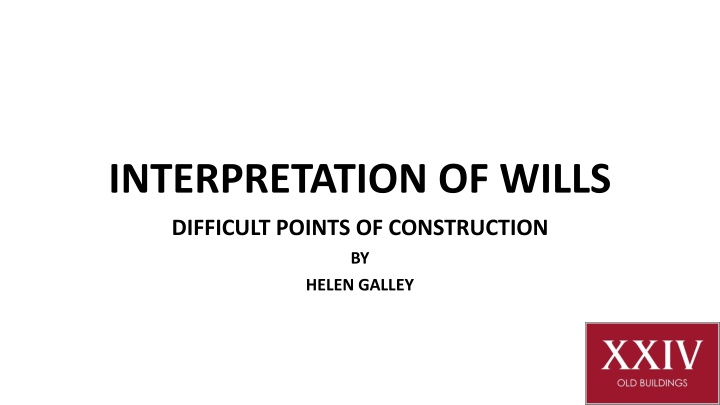

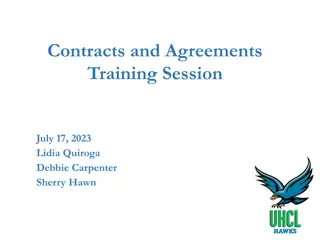
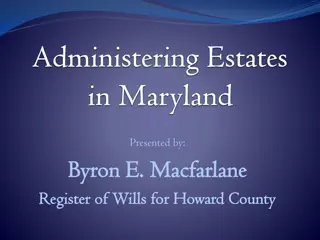
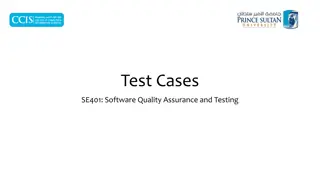


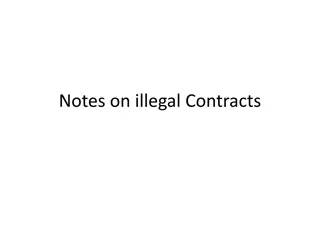
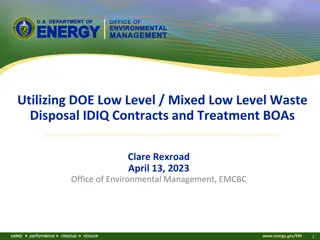

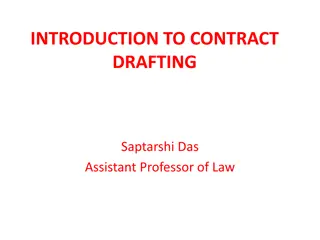
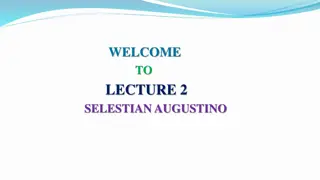
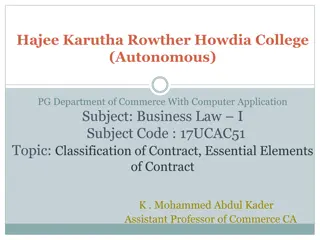
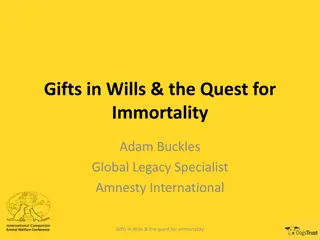
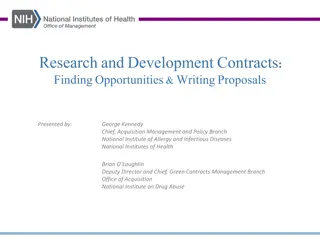
![Legal Dispute Analysis: FCA v ARCH and Others [2021] UKSC 1](/thumb/189783/legal-dispute-analysis-fca-v-arch-and-others-2021-uksc-1.jpg)
![Importance of Rock v. MWB [2018] UKSC 24 as Explained by Lord Sumption](/thumb/193348/importance-of-rock-v-mwb-2018-uksc-24-as-explained-by-lord-sumption.jpg)
